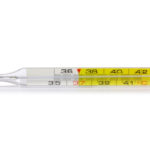Fever 101
Everyone has had a fever at some point in their life. We all know that cold shiver, loss of appetite and achy body feeling and countless other symptoms all too well from the countless times a fever has struck our body while growing up. There are certain reasons these symptoms take place, so we figured it would be fun and educational to explore the science behind them.
1. Why do we feel cold? Our hypothalamus is what controls our internal body temperature. At a regular temperature of 98.6°F, we feel healthy as ever and react normally to external temperature changes. When your body develops a fever, your hypothalamus actually raises your internal body temperature in attempt to fight off whatever infection you have. When this happens, you are more sensitive to external temperature changes do to your internal temperature being heightened. For example: at a normal internal temperature of 98.6°F, an external temperature may feel warm, but if your body raises its internal temperature to 100°F, that 80°F external temperature may have a much colder feeling to it. This then causes a chain reaction throughout your body to do everything it can to recapture escaping heat, i.e. shivering and goosebumps.
2. Why do we lose our appetite? Our body automatically does everything it can in order to save its energy to fight off infections. Digestion takes up a large amount of energy, which causes that system to be the first to slow down as we fight off our illness. This is why we tend to lose our desire to eat when we are sick.
3. Why do we feel achy? When we get sick, our white blood cells are out first line of defense against infections. With this being the case, our body calls them away from our joints and muscles to defend our body. This absence of white blood cells in our joints and muscles then causes a feeling of soreness and aches.


